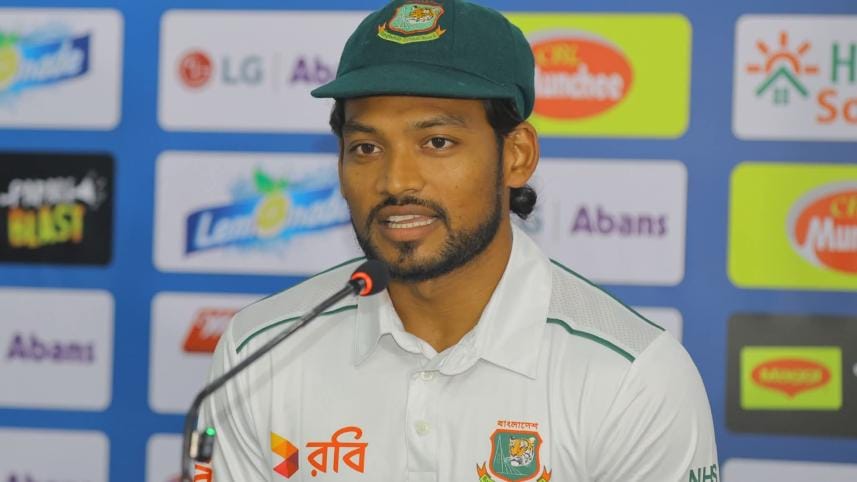Shanto’s quiet protest?

The Sinhalese Sports Club [SSC] in Colombo bore witness to more than just a crushing innings defeat for Bangladesh in the second and final Test of the two-match series today.
On that quiet afternoon, amid the shadows of a failed Test, Najmul Hossain Shanto walked into the press room and delivered not just a statement but a mirror -- held up to the functioning of the Bangladesh Cricket Board [BCB].
"I am stepping down as the captain of the Bangladesh Test side … It is not personal. It is for the betterment of the team."
But beneath the composed tone was a current of disappointment, frustration and above all disillusionment. What unfolded in the days leading up to this moment wasn't merely a change in leadership -- it was an indictment of how the BCB, under its current leadership, has failed to show the basic professional courtesy and clarity that modern cricket demands.
Let's break it down.
Shanto was appointed captain across formats under the previous board. His results in T20Is were modest, and he voluntarily stepped down from that role. In Tests and ODIs, he continued to lead, and with some success in the longer format -- statistically emerging as the most successful Test captain Bangladesh has had in terms of win ratio.
Ahead of the recent tour to Sri Lanka, the BCB extended his Test captaincy. Shanto came to the June 12 pre-tour press conference expecting to speak as the ODI skipper as well. He even had a meeting lined up with head coach Phil Simmons to discuss the ODI squad.
What happened next was baffling. In a virtual meeting that very day, the board decided to appoint Mehidy Hasan Miraz as the ODI captain.
And Shanto? He wasn't even consulted -- let alone informed beforehand. The decision was made, the press release was issued the next day and the man who thought he was still captain found out like everyone else: through the media.
This wasn't a difference of opinion. This was disregard.
Where was the communication? Where was the respect due to the captain of the national team? BCB President Aminul Islam Bulbul later claimed that Shanto had accepted the decision after a conversation with a board director.
But Shanto's public resignation and his words at the post-match press conference tell a very different story. "This is for the betterment of the team," he repeated -- yet it was clear he had been cornered into this decision by a lack of dialogue and by policies being dropped on him rather than discussed with him.
What makes the situation more unfortunate--and frankly, ironic -- is that both Bulbul and Nazmul Abedeen Fahim, key figures in the current BCB leadership, were once vocal critics of exactly these kinds of opaque, top-down decisions.
When they were outside the power circle, they championed transparency, communication and respect for players. But now, in charge, they have overseen a policy shift that sidelined a sitting captain without a direct conversation.
The larger issue is the BCB's muddled approach to leadership roles. Shanto pointed to the challenge of managing three different captains for three formats.
It's a debatable cricketing philosophy, and differences in opinion are natural in any administration. But what's inexcusable is the lack of professionalism in implementing it. If the board truly believes in this multi-captain model, shouldn't that belief be shared and discussed with those most affected?
The absence of that conversation is telling.
During the celebration of 25 years of Test status, this resignation brings an uncomfortable reality to the fore. While the BCB was busy patting itself on the back, one of its most promising captains was left feeling unheard, disrespected and disillusioned.
It's a sobering reminder that commemorative silver jubilee banners mean little if those entrusted to carry the team forward aren't treated with basic dignity.
Shanto didn't lash out. He didn't name names. But his departure is a loud, unmissable protest. In a system that still struggles with ego, opacity, and top-down control, Shanto's calm stand rings louder than any emotional outburst ever could.




 For all latest news, follow The Daily Star's Google News channel.
For all latest news, follow The Daily Star's Google News channel.
Comments